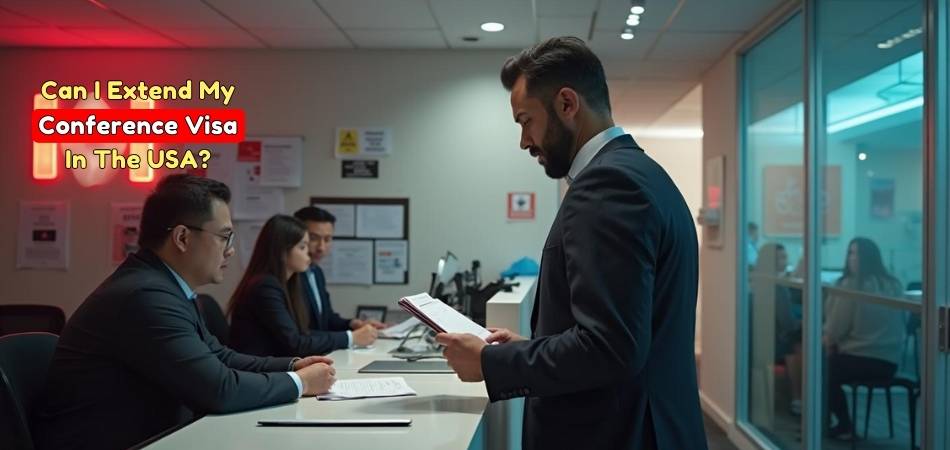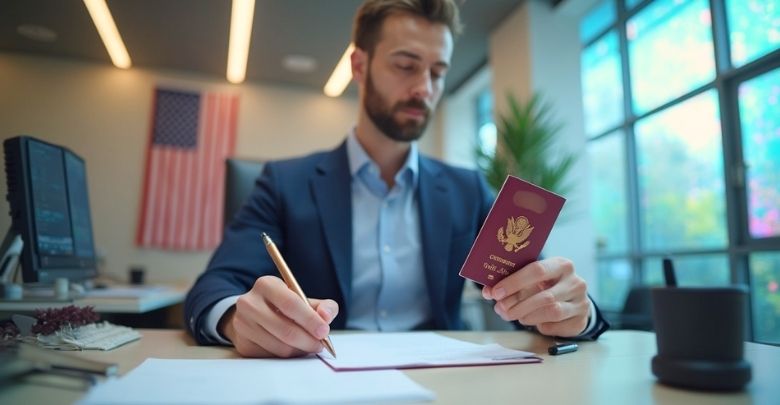There is no better way to network, learn, and grow professionally than to attend a conference in the USA. However, unexpected circumstances may require you to stay longer than planned. This can cause you to think: Can I extend my conference visa in the USA?
Yes, you can extend your conference visa in the USA. To do so, you must apply for an extension before your current visa expires. Make sure you meet eligibility requirements and provide the necessary documentation, including proof of ongoing conference participation and valid reasons for extending your stay.
Interested in learning more about the step-by-step process, required documents, and tips for a successful visa extension? Continue reading to explore a detailed guide on extending your U.S. conference visa and ensuring a smooth, stress-free experience.
Can I Extend My Conference Visa in the USA?
Yes, you can extend your conference visa to the USA if you meet the eligibility requirements. Staying longer requires valid reasons and proper documentation. Planning ahead is essential to avoid any legal issues during your stay. Always ensure you apply before your current visa expires.
Attending professional events like conferences in USA 2025 with invitation letter may require additional time for networking and learning. An extension allows you to fully engage in these opportunities. It ensures you can make the most of your visit without rushing or missing important sessions.
Overstaying your visa without approval can lead to serious legal problems. It may affect future travel plans, visa applications, and cause you to face fines or deportation. Always prioritize legal compliance to maintain a positive travel record and avoid complications.
If you’re considering extending your visa, understand the rules and prepare the necessary documents. Being informed helps you avoid delays or rejection. Staying organized ensures a smoother experience during your extended stay and keeps your status legal.
Why Do Attendees Extend Their USA Conference Visas?
Conferences in the USA offer valuable networking and educational opportunities. However, some attendees find themselves needing extra time. Here are a few reasons why individuals might extend their USA conference visas:
Networking and Building Connections
Attendees often extend their visas to deepen professional connections made during the conference. Building long-term collaborations requires additional time for follow-up meetings. Networking opportunities may extend beyond the event, such as post-conference gatherings. Extra time allows attendees to explore broader industry engagements in the host city.
Exploring Post-Conference Opportunities
Many conferences offer workshops or training sessions scheduled after the main event. Attendees extend their stay to gain these additional skills. Staying longer also helps them fully utilize educational opportunities unavailable during the main conference. These extended activities improve the overall learning experience.
Conducting Research and Field Studies
For professionals and researchers, conferences often lead to new research interests. Extending the visa provides time to visit local libraries or labs. Field studies in the host country add valuable insights to their ongoing work. A longer stay ensures their research is meaningful and comprehensive.
Exploring Career Opportunities
Some attendees use the extended period to explore potential career opportunities in the USA. They may consider changing conference visa to work permit if applicable. Networking with employers during this time can be a strategic move. Such extensions align with professional goals for many attendees.
Engaging in Industry Events
Industry-specific events, often planned around the main conference, attract attendees to stay longer. These include trade shows, exhibitions, and company visits. Such events provide deeper industry insights and exclusive opportunities. Extending the visa allows participation in these complementary activities.
Cultural Exploration and Relaxation
Many attendees extend their visas to experience local culture and attractions. Visiting iconic landmarks and engaging with the local community adds value to their trip. A longer stay allows for a blend of professional and personal fulfillment. It ensures attendees leave with enriched memories beyond the conference.
USA Conference Visa Extension Eligibility Criteria: What Are They?
A USA conference visa extension can provide valuable networking, learning, and professional development opportunities. However, specific eligibility requirements must be met to qualify for an extension. Being aware of these criteria helps you prepare and improves your chances of approval.
Valid and Unexpired Visa Status
Applicants must hold a valid, unexpired visa at the time of applying for an extension. Overstaying your visa without applying can lead to denial. Applying before your visa expires shows responsibility. It also keeps your immigration record clean for future travel.
Strong Justification for Extension
A clear and valid reason for staying longer is essential for approval. This could involve ongoing research or attending additional workshops. Supporting documents must prove the need for the extension. Without valid reasons, applications are often rejected.
Proof of Financial Stability
You must demonstrate the ability to support yourself during the extended stay. This includes bank statements or proof of sponsorship. Financial stability ensures you won’t become a burden to the U.S. government. It strengthens your visa extension request.
No Violation of Visa Conditions
Applicants must not have violated any visa conditions during their stay. This includes working without authorization or overstaying. Violations can result in immediate denial of the extension. A clean record is crucial for approval.
Health-Related Considerations
Health issues can justify the need for an extension in certain cases. In the case of attending a conference in the US if you have health issues, medical documents may support your request. This shows your health concerns are genuine. Such evidence can strengthen your application.
Timely Submission of Application
Submitting the extension request on time is crucial for approval. Late applications often face automatic rejection. Apply at least 45 days before your visa expires. Early submission increases your chances of success.
Steps You Can Take to Extend Your Conference Visa in the USA
If you need to extend your conference visa to the USA, you should follow the right steps. The process involves completing forms, gathering documentation, and submitting your application on time. Here’s a step-by-step guide to help you with the extension process.
Step 1: Know Eligibility Requirements
Before applying for a visa extension, review all eligibility criteria carefully. Ensure your visa is valid and hasn’t expired yet. You must also provide a valid reason for the extension, like ongoing conference activities. Violating visa conditions, such as unauthorized work, can disqualify you from an extension.
Step 2: Gather Required Documents
Prepare essential documents, including Form I-539, financial statements, and a copy of your passport. You’ll also need a conference invitation letter or proof of participation. Medical records may be necessary if your extension is health-related. Submitting complete and accurate documents improves your chances of approval.
Step 3: Complete Form I-539
Pay careful attention to details when filling out Form I-539, Application to Extend/Change Nonimmigrant Status. Double-check all personal and visa-related information for accuracy. Errors in the form can delay processing or lead to denial. Ensure the form aligns with the supporting documents provided.
Step 4: Pay the Application Fee
Pay the mandatory fee, which varies based on your visa type and application. Fees can be paid online through the USCIS portal or via money order. Include proof of payment with your application package. Retain a copy of the payment confirmation for future use.
Step 5: Submit the Application
Submit your completed application either online or by mailing it to USCIS. Use the official USCIS address listed for your application type. Organize all documents neatly to avoid misplacement or rejection. Always keep a copy of the submitted documents for your records.
Step 6: Check Application Status Regularly
Monitor the progress of your application using the USCIS online portal. Look for updates on any required additional documents or actions. Respond promptly to any USCIS notifications to avoid delays. Staying informed helps ensure you meet all follow-up requirements.
Step 7: Remain in the U.S. Legally
Stay in the U.S. legally while your application is being processed, provided you applied before your visa expired. Overstaying without applying can result in fines or reentry bans. Wait for USCIS approval before finalizing any travel or work-related plans. Legal compliance ensures a positive immigration record.
What Happens If Your USA Conference Visa Extension Request Is Denied?
Facing a denial for your USA conference visa extension can be stressful and may impact your future travel plans. Taking the right steps requires understanding the possible consequences. Here’s what could happen if your extension request is denied.
- Immediate Departure Requirement: You must leave the USA immediately after your extension is denied. Overstaying may result in legal action or future visa denials.
- Impact on Future Visa Applications: A denied extension can negatively affect future visa applications. Immigration officers may view it as a red flag for approval.
- Visa Overstay Consequences: Overstaying after denial can lead to bans from reentering the USA. It may result in being barred for several years.
- Loss of Non-Refundable Fees: Visa application fees are non-refundable even after a denial. You cannot recover the money spent on processing fees.
- Limited Appeal Options: There is no formal appeal process for a denied visa extension. You must leave the country or explore other legal options.
- Risk of Deportation: Remaining in the USA after denial could lead to deportation. This action may severely impact your immigration record.
- Difficulty Obtaining Other Visas: Future visa approvals for other countries could become more difficult. Denials can influence global travel permissions and restrictions.
- Disruption of Professional Plans: A denied extension can disrupt conference participation or professional meetings. This can negatively impact networking and collaboration efforts.
Is It Easier to Apply for a New Visa Instead of Extending?
No, applying for a new visa is not always easier than extending your current one. Visa extensions allow you to stay legally without leaving the country. They also avoid the time and expenses involved in starting a new application process from your home country.
Applying for a new visa requires returning to your home country and completing a fresh application. This process can be time-consuming and may cause delays in your plans. In contrast, extensions offer a more streamlined approach if you meet eligibility requirements and provide proper documentation.
However, a new visa might be necessary if your extension is denied or your stay requires a different purpose. Starting fresh may provide flexibility for long-term plans. Carefully consider your situation and consult with an immigration expert for the best choice.
Answers to Some Common Questions
If you’re considering extending your conference visa to the USA, you may have a few additional questions. Below are some frequently asked questions that address common concerns and provide clear answers to guide you through the process.
Can I Travel Within the USA While My Visa Extension Is Pending?
Yes, you can travel within the USA while your visa extension is pending as long as your original visa hasn’t expired. However, you should carry proof of your pending application and valid identification at all times to avoid any legal issues.
How Long Can I Stay in the USA After Applying for a Visa Extension?
If you applied for the extension before your visa expired, you are allowed to stay in the USA legally while waiting for a decision. However, leaving the country during this period may result in the application being considered abandoned.
Can I Work in the USA While My Conference Visa Extension Is Processing?
No, working on a conference visa (B-1/B-2) is not permitted, even if your extension is pending. Engaging in unauthorized employment can lead to immediate denial and potential deportation, severely impacting future visa applications.
Is Premium Processing Available for Conference Visa Extensions?
No, premium processing is not available for B-1/B-2 visa extensions. All applications must follow standard processing timelines, which can take several weeks to months depending on USCIS workload.
Do I Need a Lawyer to Apply for a Visa Extension?
Hiring a lawyer is not required, but it can be helpful if your case is complex. An immigration attorney can guide you through the process and ensure your application is complete and accurate.
How Do I Know If My Visa Extension Is Approved?
USCIS will notify you through mail once a decision is made on your extension request. You can also check the application status online using your receipt number provided by USCIS.
Final Thoughts
Attending a conference in the USA offers valuable opportunities for professional development, and extending your visa will help you maximize your opportunity for success. If you’re wondering, can I extend my conference visa in the USA, the answer is yes, as long as you meet the eligibility requirements.
It’s wise to apply before your current visa expires and provide the necessary documentation, including proof of continued participation. Remember, applying for an extension is typically more efficient than applying for a new visa, saving you time and effort. If your extension request is denied, it can impact future travel plans, so make sure to stay informed and follow all steps carefully.








